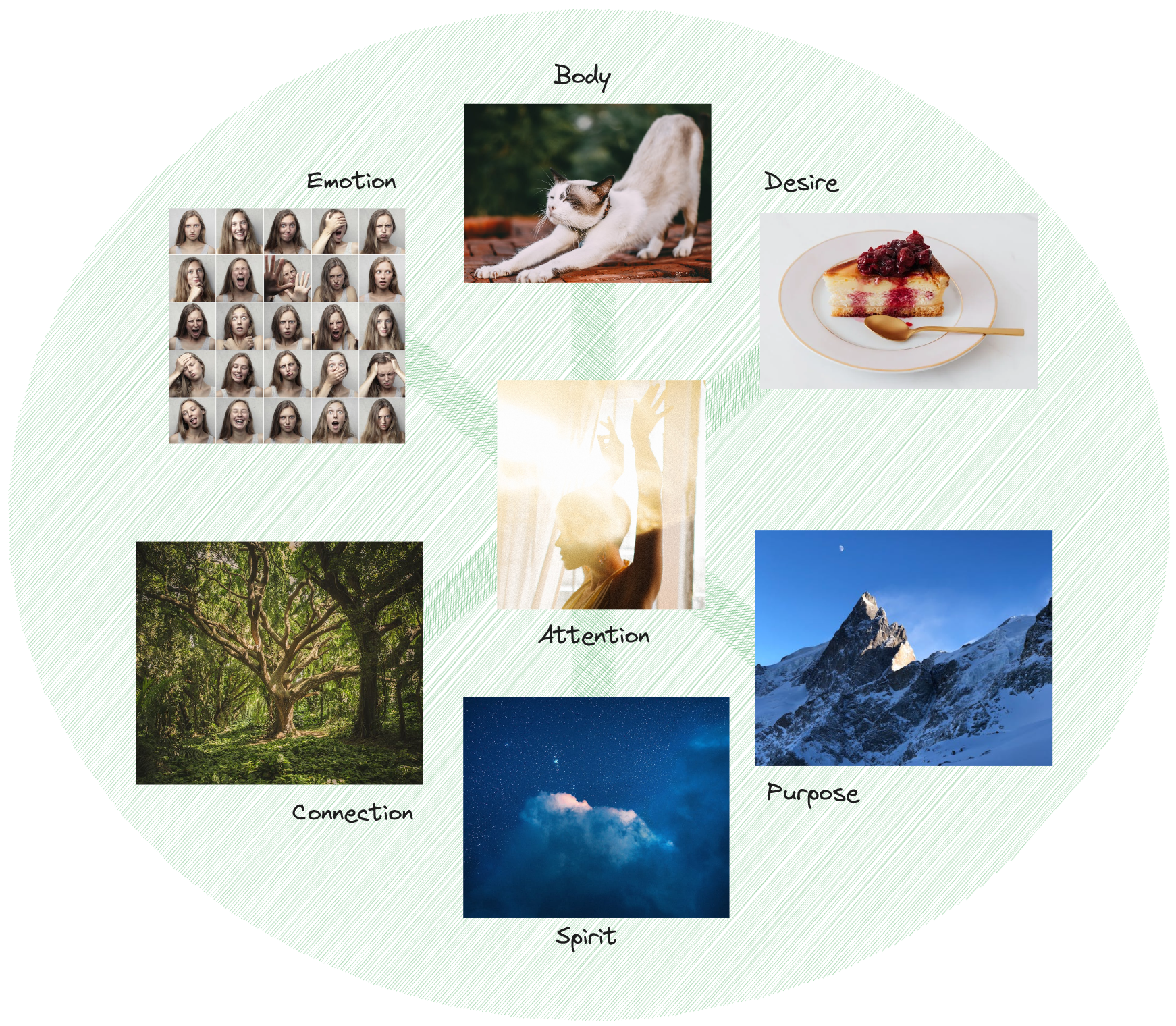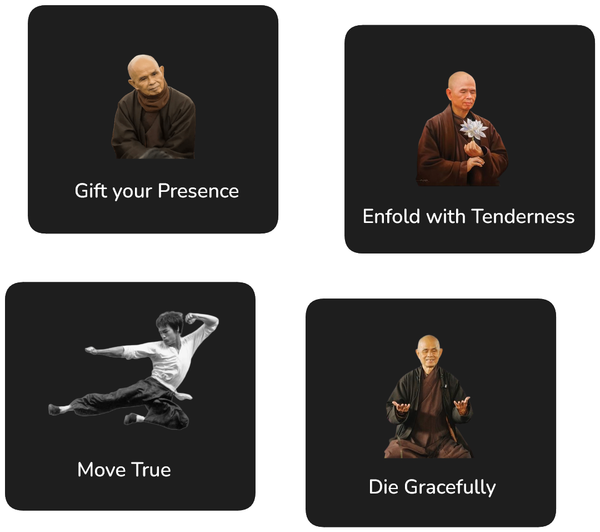A Framework for the Mastery of Life (V0.1)
Describes a framework for the mastery of life based on various elements of mastery, such as mastery of our body, emotions and thought.

With only one life to live and it being of limited duration, it is important to try to make the most of it. But how? This question is not new; our ancestors contemplated it for thousands of years. I've delved into the wisdom of ancient philosophies of Stoicism and Buddhism, as well as modern scientific disciplines such as positive psychology and social biology in order to find an answer to this question for myself.
I'm far from finding a fully satisfactory answer. However, I believe there is value in sharing my current state of thinking on this matter, which I present in this article for your consideration.
In previous articles, I have explored the surprising utility of skills such as breathing, thinking, and waiting. In this article, I outline the general areas where gaining mastery can bring significant benefits. These areas draw inspiration from tradition, philosophy, and religious discourse. I do not claim that this list is exhaustive or inherently superior to any other. It simply represents the best compilation I have been able to create thus far.
Without further ado, let me present the framework of key masteries I deem worth considering for living a good life:

- Mastery of Body: Nurturing and mastering our bodies for a healthier and more fulfilling existence.
- Mastery of Emotion: Understanding and shaping our emotional landscape.
- Mastery of Desire: Identifying and diminishing the impact of desires on our well-being.
- Mastery of Thought: Developing our thinking abilities to shape our lives with greater clarity and purpose.
- Mastery of Connection: Connect with various aspects of our world to foster unity, compassion, and spiritual ascension.
- Mastery of Purpose: Discovering our unique role and contribution within the grand scheme of existence.
- Mastery of Spirit: Nourishing our connection to what cannot be touched, seen, heard and fully understood.
In the following sections, I will explain each of these masteries and present some starting points on how we can improve them.
Mastery of Body

The body is our manifestation in this world, serving as the vessel that connects our thoughts and spirit with the physical realm. With the body being so important in how we perceive and feel the world, it becomes paramount to nurture and master our bodies for a healthier and more fulfilling existence.
Below a number of ideas how to improve our body to live a better life:
Sleep: We often perceive sleep as a waste of time. However, getting sleep of a sufficient duration and quality is critical for our health and well-being. Ask yourself: do I wake up without my alarm and feel well-rested. If the answer is no, you can probably improve your sleeping habits.
Weight: One fundamental aspect of body mastery is maintaining a healthy weight, which offers numerous benefits for our overall well-being. By prioritising weight control and keeping our weight within a healthy range, we can enhance our energy levels, reduce the risk of chronic diseases, and improve our body's overall health. Achieving a healthy weight is a vital first step in our journey towards body mastery.
Nutrition: Another key element in this journey is providing our bodies with proper nutrition. Research consistently emphasises the significant impact of nutrition on our health and well-being. By adopting a balanced and nutrient-rich diet, we can nourish our bodies, prevent illnesses, and optimise our physical and mental functioning.
Endurance: Endurance training is another important aspect of body mastery. Engaging in activities such as aerobic exercises, running, or swimming helps strengthen our cardiovascular fitness and stamina. Regular endurance training improves heart health, enhances lung capacity, and boosts overall endurance levels, contributing to our physical well-being.
Strength: Strength training is essential for developing functional strength and preserving our physical capabilities, especially as we age. By engaging in resistance exercises and weightlifting, we can build muscle mass, increase bone density, and enhance our body's strength, stability, and resistance to injuries.
Flexibility: Flexibility exercises, including stretching and yoga, also play a significant role in our body's mastery. Improving flexibility enhances joint mobility, reduces muscle stiffness, and helps prevent injuries. By incorporating flexibility exercises into our lives, we can enjoy greater freedom of movement and promote overall physical well-being.
Coordination: Coordination involves harmonising different body movements for efficient performance. Practising activities that challenge coordination, such as dance or martial arts, improves motor skills, body awareness, and spatial perception.
Mastery of Emotion

Emotions serve as the connection between our thought world and our physical bodies, exerting a profound influence on both. The interrelationship between emotions and the body is significant, and through our thoughts, we possess some degree of control over this intricate connection. For example, by consciously breathing calmly and intentionally directing our thoughts towards tranquillity, we can induce a sense of calmness in our body's emotional state.
Emotions can be categorised into positive and negative experiences, each holding a unique impact on our well-being. The ancient philosophy of Stoicism highlights the destructive nature of negative emotions, particularly anger. Seneca, one of the prominent Stoic philosophers, remarked, "Anger, if not restrained, is frequently more hurtful to us than the injury that provokes it." Similarly, Marcus Aurelius, another influential Stoic philosopher and Roman emperor, advocated for the mastery of negative emotions to maintain inner peace and tranquillity.
In Buddhism, emotions are a central focus of contemplation and practice. The concept of the four immeasurable minds, elucidated among others by Thich Nhat Hanh in his seminal work The Heart of the Buddha's Teaching, outlines positive emotions that Buddhists aspire to cultivate. These four immeasurable minds are joy, compassion, love, and equanimity. By mastering these emotions, individuals tread upon a virtuous path that fosters harmony, kindness, and well-being.
To master our emotions, it is essential to develop certain skills and practices. The following presents some ideas to increase our mastery:
Name and Identify: Emotions are often complex and intertwined, making it challenging to discern their specific nature. However, by dedicating time and effort to introspection, we can become more adept at recognising and labelling our emotional states, whether it be anxiety, anger, annoyance, or frustration. A great resource for starting to map out your emotions is the Emotion Typology website, which lists and describes many common emotions we encounter.
Contain and Channel Negative Emotions: Learning how to contain and transform negative emotions into positive action is a very important skill. When confronted with anger, for instance, it is vital to acknowledge its presence and explore strategies for controlling it. Redirecting anger towards more constructive emotions, such as focusing on love for a cherished individual rather than dwelling on the cause of anger, can improve our well-being significantly. However, we should also take note of what causes our anger, since it may be justifiably caused, and explore if we should take it as motivator for further action (with a cool head).
Embrace Positive Emotions: Identifying the factors that evoke positive emotions within us and nurturing those experiences allows us to fully embrace and appreciate them. In Buddhism, specific meditative practices are designed to cultivate and deepen positive emotions like the four immeasurable minds, joy, compassion, love, and equanimity, enabling individuals to develop mastery over their emotional landscape.
Understand the Fleeting Nature of Feelings: In Buddhism, feelings both good and bad are seen as something to be accepted but not embraced. This is for instances discussed in The Discourse-grouping on Feelings (Vedana-Samyutta) (also see Contemplation of Feeling):
Be it a pleasant feeling, be it a painful feeling, be it neutral,
one's own or others', feelings of all kinds —
he knows them all as ill, deceitful, evanescent.
Seeing how they impinge again, again, and disappear,
he wins detachment from the feelings, passion-free.
By mastering our emotions, we empower ourselves to navigate life's challenges with greater resilience, serenity, and emotional well-being. It is an ongoing process that involves self-reflection, self-regulation, and a willingness to embrace and transform our emotional experiences. Through these efforts, we can enhance our overall quality of life and foster harmonious relationships with ourselves and others.
Mastery of Desire

Desire holds a significant place in various philosophical traditions, including Buddhism and Stoicism. In Buddhism, the focal attention given to alleviating suffering led to the recognition that desire is a fundamental cause of human suffering. The impermanence of all things, including life itself, necessitates the cessation of desire to attain true freedom from suffering. Whether it is the desire for good health or the longing to be with loved ones, the inevitability of impermanence means that such desires will ultimately lead to suffering.
Stoicism, too, offers insights into the mastery of desire. Stoic teachings emphasise focusing on what is within our control and relinquishing attachment to what lies beyond our control. By detaching ourselves from desires for things outside our control, we can avoid fruitless efforts and find greater contentment. This notion aligns with the idea of overcoming desire to attain inner peace and freedom from unnecessary suffering.
To master our desires, we can explore several approaches:
Identify Desires: This may require introspection and self-reflection, as desires can sometimes be hidden beneath layers of conditioning or societal expectations. By investing time in understanding our desires, we gain a clearer awareness of their influence on our thoughts and actions.
Quieting of Desires: While complete elimination of desires may be challenging, we can work towards diminishing their impact on our well-being. Practices such as fasting can help us develop self-control and reduce the intensity of our desires.
Waiting: Learning the art of waiting can contribute to the quieting of desires. Cultivating patience and the ability to delay gratification helps to diminish the immediate urgency of our desires. By embracing the virtue of waiting, we can foster resilience and self-discipline, which in turn enhances our mastery over desires.
As we continue our journey towards mastering desire, it is important to approach it with patience and self-compassion. Overcoming desire is not an easy task, and progress may vary for each individual. However, by engaging in practices that allow us to identify desires, quiet their influence, and embrace patience, we can gradually increase our mastery over desire, leading to greater contentment and freedom from unnecessary suffering.
Mastery of Thought

Thinking plays a crucial role in the mastery of our emotions, desires, and various aspects of our lives. It serves as an overarching skill, enabling us to understand and navigate the complexities of our inner world. Through thinking, we can gain insight into ourselves, our emotions, and our desires. Moreover, it empowers us to become the captains of our own ships, guiding our lives rather than merely being passengers adrift.
Thinking serves as a bridge between our body and spirit, allowing us to transcend basic bodily perceptions and connect with something greater. It is through thinking that we can elevate our understanding and explore profound concepts that transcend the physical realm. Without the ability to think deeply and critically, we would struggle to make sense of our experiences and find meaning in our existence.
To master thinking and enhance this vital skill, we can pursue the following:
Contemplate: In our modern world, we often fill every moment of our day with distractions, seeking to escape the silence necessitating to confront our thoughts. By intentionally carving out time for quiet reflection, we create space for deeper thoughts and insights to emerge. Embracing moments of solitude and silence allows us to connect with our inner selves and develop a greater understanding of our thoughts and emotions.
Study: The mastery of thought can be cultivated through learning and study. By seeking knowledge, particularly in areas relevant to our current challenges, we equip ourselves with valuable tools to navigate our emotions and desires. Exploring the wisdom of religions, psychology, and other fields can provide insights and techniques for better identifying and managing our internal experiences. Through education, we expand our understanding and refine our thinking processes.
Discuss: Engaging in discussions with others also contributes to the mastery of thought. Conversations allow us to share and explore our thoughts, opening up new perspectives and filling gaps in our knowledge. Through dialogue and exchanging ideas, we can challenge our own assumptions, refine our thinking, and gain fresh insights. Collaborative thinking fosters intellectual growth and helps us refine our understanding of ourselves and the world around us.
By prioritising contemplation, pursuing knowledge, and engaging in meaningful discussions, we can enhance our mastery of thought. This meta skill serves as a foundation for understanding ourselves, controlling our emotions and desires, and connecting with deeper truths. Through disciplined thinking, we unlock the power to shape our lives, cultivate wisdom, and navigate the complexities of our existence with greater clarity and purpose.
Mastery of Connection

Mastery of Connection involves nurturing our ability to connect with various aspects of our world, including nature, fellow beings, the inanimate world, and, for some, the spiritual realm. While this area is still a work in progress for me personally, I would like to share the insights I have gathered thus far.
Arguably the most important connections for us are our relationships with those close to us, our family and our most dear friends. These are for instance central to the thinking of Confucius, who identified five key relationships important to our lives: between ruler and subject, parent to child, between siblings, between spouses, and between friends. It is easy to see that without having a good relationship with out parents, or having found peace with a lack thereof, it is difficult to lead a good life.
But connection also encompasses our bond with the natural world around us. This involves fostering a deep appreciation and reverence for nature's beauty, recognising our interconnectedness with ecosystems, and cultivating a sense of responsibility towards preserving the environment. Additionally, connecting with fellow beings, both human and animal, allows us to experience empathy, compassion, and a shared sense of humanity.
In Buddhism, the concept of interbeing emphasises the interconnectedness of all things. This profound understanding reveals that we are not isolated entities but rather integral parts of an intricate web of existence. As Thich Nhat Hanh once said, "The wave does not need to die to become water. She is already water."
While my understanding of the mastery of connection is a work in progress, it is evident that developing a profound appreciation for nature, fostering connections with fellow beings, and acknowledging our interconnectedness can contribute to our overall well-being. Exploring the wisdom of interbeing in Buddhism and embracing the concept of seeking nourishing connections can guide us on this journey. As we continue to delve deeper into the realm of connection, we open ourselves up to a world of unity, compassion, and a greater understanding of our place within the intricate tapestry of existence.
Mastery of Purpose

Mastery of Purpose involves discovering our place in the universe and understanding the ultimate significance and direction of our actions or inactions.
Purpose encompasses our quest to understand our unique role and contribution within the grand scheme of existence. It involves unravelling the larger meaning behind our actions, seeking clarity on our personal calling, and aligning our pursuits with a deeper sense of purpose.
Identifying and finding purpose is a deeply personal and introspective journey. While religion and tradition used to provide us with clear answers (e.g. 'reach heaven by leading a virtuous life.'), many of us are left seeking a purpose with little guidance. A good starting point is to look at what you value or enjoy doing in life. For some further ideas, please see my article Defining a Personal Purpose: A Practical Guide with Five Questions.
While I am currently unsure of specific techniques or practices for enhancing our mastery of purpose, I am committed to discovering and sharing them as I continue to explore this question.
Mastery of Spirit

I love the word 'spirit' since it encompasses a broad range of meanings that resonate well with the possible underlying concepts it may represent. Spirit can be understood in a strictly religious sense as the 'Holy Spirit', in a semi-religious sense as the soul which endures after we die, or in a more secular sense as a 'force or principle to animate living beings'.
No matter what we interpret the word 'spirit' to mean, we seem to have an innate capacity to seek out something beyond our mere physical existence. While I believe that the pursuit of organised religion is something that can easily lead us astray (such as into wars and genocide), embracing spiritual meaning is generally found to be beneficial for our wellbeing.
I think mastery in this area of our lives does not come easily to us; especially in our modern world which is built on rationality and science. However, one approach that resonates with me is the idea of identifying the elements that nourish our spirit and actively seeking them out. The blog "The Marginalian" often delves into this concept, emphasising the importance of recognising and prioritising activities and experiences that uplift and inspire us (See learning "Seek out what magnifies your spirit.").
How It All Connects
Our existence is intricately wedged between the realms of body and spirit, and the various masteries we cultivate serve as navigational tools in this space. These interconnected masteries work in harmony, influencing and supporting one another, ultimately bridging the gap between our physical and spiritual selves.
The Mastery of Emotions plays a significant role in our overall well-being, and it intertwines with the mastery of the body. By understanding and managing our emotions, we can enhance our physical health. For example, cultivating positive emotions and reducing negative ones can contribute to a healthier body by reducing stress, boosting the immune system, and promoting overall vitality. Similarly, by mastering the body, nurturing its well-being through proper nutrition, exercise, and self-care, we can positively influence our emotional state and achieve greater emotional resilience.
The Mastery of Desire allows us to consciously direct our focus and energy (active), ultimately influencing the emotional landscape we inhabit (reactive). As we align our desires with our core values and release attachments to external outcomes, we navigate emotions with greater composure and serenity. This synergy between mastering desires and emotions leads to a harmonious and balanced internal state.
The Mastery of Thought serves as a powerful tool that connects and influences multiple areas of our lives. By developing our thinking abilities, we can better understand and manage our emotions and desires. Through thoughtful introspection and self-reflection, we gain insights into our emotional landscape, enabling us to navigate and respond to our emotions in a more balanced and constructive manner. Additionally, thinking helps us critically examine our desires, discerning between fleeting wants and deeper needs, thereby guiding our actions and choices towards aligning with our values and aspirations. The Mastery of Thought also fuels our exploration of purpose, as it aids us in contemplating our place in the universe and illuminating the path towards a meaningful existence.
The connection between Mastery of Though and the Mastery of Connection lies in their shared capacity to broaden our perspectives and deepen our understanding of the world. By cultivating a thoughtful mindset, we can engage in meaningful connections with others, fostering empathy, compassion, and a sense of interconnectedness. As we develop our thinking abilities, we become more open to diverse perspectives, allowing for richer and more profound connections with the world around us. The Mastery of Connection, in turn, nourishes our purpose, as it connects us to the larger tapestry of existence and allows us to explore and align our actions with a deeper sense of meaning.
Finally, all these masteries collectively bridge the gap between the physical and spiritual realms, guiding us towards a more integrated and harmonious existence. As we nurture our physical well-being, understand and manage our emotions, refine our thinking, foster meaningful connections, and explore our purpose, we create a synergy that resonates within both our physical bodies and our spiritual essence. This integration supports our journey towards wholeness, allowing us to navigate the space between body and spirit with greater clarity, purpose, and fulfilment.
Conclusion
Our lives are short, and most of us recognise the value in becoming good at various skills to make the most of the time that we have. However, we often focus on superficial skills that do not significantly impact our overall well-being.
I tried to identify a number of skills that have the potential to affect our life in a deep and lasting way. As mentioned, I do not claim for this list to be exhaustive or correct. It represents my current state of thinking that I am reasonably certain will change as I advance further in my studies and thinking.
I hope that this article provides some starting point for thought and encourages you to contemplate what things it really matters to become good at. Please reach out if your conclusions differ from what I presented here.





